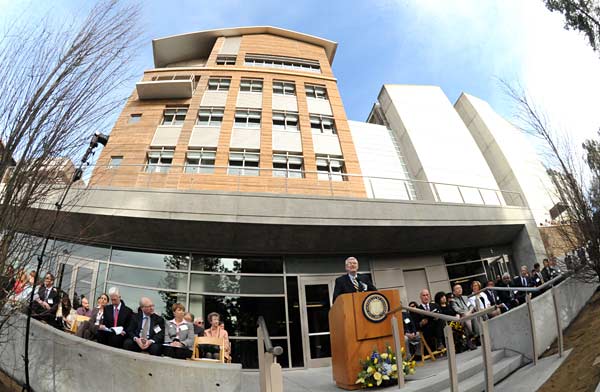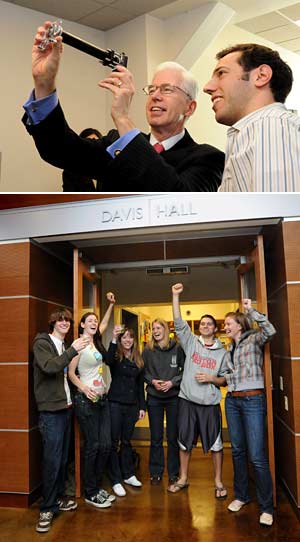 The opening of the campus's new CITRIS building was marked with speeches and ceremony, tours and exhibits. (Peg Skorpinski photo)
The opening of the campus's new CITRIS building was marked with speeches and ceremony, tours and exhibits. (Peg Skorpinski photo)Campus turns out for opening of Sutardja Dai Hall
Dedication of CITRIS building draws hundreds to celebrate an 'incredible milestone'
| 04 March 2009
 Former California Gov. Gray Davis (at left in photo, top), seen here with bioengineering grad student David Breslauer, gets a close-up look at an innovative technology during the CITRIS tour. Also enthusiastic about the building's opening are the grad students who will be working there (above). (Peg Skorpinski photo)
Former California Gov. Gray Davis (at left in photo, top), seen here with bioengineering grad student David Breslauer, gets a close-up look at an innovative technology during the CITRIS tour. Also enthusiastic about the building's opening are the grad students who will be working there (above). (Peg Skorpinski photo)BERKELEY — With a mix of pomp and jaw-dropping demonstrations, Berkeley last week showed off its newest research facility — a center that both embodies the innovation and entrepreneurship needed to fuel economic growth and arrives at a time when the state and nation seek relief from the recession.
Sutardja Dai Hall, in the northeast corner of the campus, is the new home of the Center for Information Technology Research in the Interest of Society (CITRIS) and the Dado and Maria Banatao Institute@CITRIS Berkeley. CITRIS is a multidisciplinary program that combines the skills and talents of more than 300 faculty researchers and thousands of students from four UC campuses — Berkeley, Davis, Merced, and Santa Cruz — with industrial partners from more than 60 corporations.
Some 600 people turned out Friday, Feb. 27, for the festive dedication of the 141,000-square-foot, state-of-the-art facility, which is named for the Santa Clara-based semiconductor company founded by Weili Dai and Sehat and Pantas Sutardja, three Cal engineering alums.
Visitors got a first-hand look at the new building’s 149-seat auditorium, cybercafé, technology museum, distance-learning classrooms, and Marvell Nanofabrication Laboratory, whose two large cleanrooms are equipped with some of the world’s most advanced semiconductor-fabrication equipment.
They also heard from distinguished speakers and got demos of socially useful, cutting-edge inventions — from “smart” wireless thermostats to life-saving firefighting systems to an ingenious kit for diagnosing diseases in remote areas.
“In these walls, brilliant, well-trained minds will take a delicate prototype, and then, with robust engineering, create a more vital, proven concept” from which a start-up company and eventually whole industries can grow, predicted Paul Wright, director of both CITRIS and the Banatao Institute. Such a process, at this time of economic crisis, can help reignite the economy of California and beyond, he said.
As illustration, Wright held up a tiny device, consisting of a microchip, radio, and sensors, developed by campus researchers in the late ‘90s. Reports on the invention “could have sat in academic libraries, but instead, because of the ecosystem of CITRIS,” innovators in a variety of fields turned it into commercially viable inventions.
One is the “smart” thermostat, which helps home and commercial-building owners increase energy efficiency and helps utility companies avoid electric-grid overloads. Tim Simon, founder of Golden Power Manufacturing, said he learned of the new technology from CITRIS researchers, and is now selling more than a million of these programmable communicating thermostats annually.
A potential ‘engine of growth’
“This day represents an incredible milestone, nearly a decade in the making,” said major donor Dado Banatao, founder of Tallwood Venture Capital and chair of the College of Engineering’s advisory board. Both he and his wife, Maria, a trustee of the UC Berkeley Foundation, are immigrants from the Philippines, and “CITRIS’s focus on global partnerships means a great deal” to them, he said. “I believe that American universities such as UC Berkeley can become even stronger by engaging in substantial collaborations with overseas partners.”
The center’s potential role as an engine of economic growth was noted throughout the day. Chancellor Robert Birgeneau said CITRIS promises to serve society “by improving people’s health, protecting the environment, and conserving our energy resources — and by the smart kind of economic growth that the country will need in the 21st century.”
 In the Tech Museum, civil and environmental engineering professor Alex Bayen (far left) demonstrates his Mobile Millennium project, which uses GPS-equipped cell phones to provide real-time traffic conditions. (Peg Skorpinski photo)
In the Tech Museum, civil and environmental engineering professor Alex Bayen (far left) demonstrates his Mobile Millennium project, which uses GPS-equipped cell phones to provide real-time traffic conditions. (Peg Skorpinski photo)Turning research innovations into “new waves of economic growth” is “exactly what we need today,” said UC President Mark Yudof. “This is not the time to pass over and decline to invest in innovation and technology, which in the long run will bring this economy back.”
CITRIS is one of four public-private institutes for science and innovation, each with its own research theme, launched in 2001 by former Gov. Gray Davis, who spoke at the dedication. At Sutardja Dai Hall, researchers from the four UC campuses will collaborate with industrial partners to use information technology, especially sensors and transmitters, to solve social problems and then streamline their innovations’ path to market.
The new building, which replaces Davis Hall North, consists of five above-ground and two basement floors. It will be the second building on the campus connected to what was originally called the California Institutes for Science and Innovation. In 2007, the campus dedicated Stanley Hall, a cutting-edge biophysical-science research facility hosting researchers from the California Institute for Quantitative Biosciences (QB3).
“The birth of Sutardja Dai Hall signals a new stage of maturity and productivity for CITRIS,” said Wright. “The profound challenges we now face in California and the world are really tremendous opportunities for progress, ones that we stand ready to explore.”

